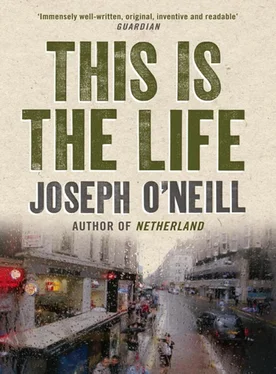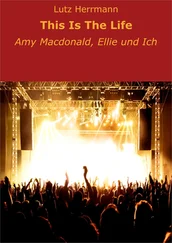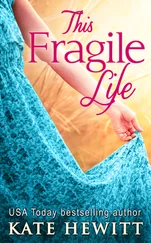Nevertheless, when I began polishing my clubs and when I caught the whiff of boiled sweets from the sweet-tin that contained my tees and markers, I began to grow excited (it is ridiculous, really, this excitability of mine). Kitted out with clean clubs and a newly furled umbrella, I began my mental preparation for the day ahead. I opened a manual — Play Golf With John Greenan — and refreshed myself about the essentials of the game, intently studying the photographs of the coach’s famous swing. Inspired and fired-up by this literature, I drew open the curtain in the living-room, took out a nine-iron and began rehearsing my swing, studying all the while my reflection in the window. I stopped almost immediately. I looked terrible. My round, awkward, contorted body looked terrible.
I turned in early, at a child’s bedtime, and like a child I fantasized about all the great shots I would play. In my mind I burned up that course. I did not sleep until half-past two.
The next day, when I had driven slowly past the gates of Highgate Golf Club and was approaching the clubhouse, the gravel crackling and fizzing under my tyres, I caught sight of a man in shocking tartan trousers taking some practice swings in the net; my playing-partner, Fergus Donovan. I stopped the car and studied him. Even at his age he struck the ball sweetly, and plainly he was a gifted player. What was he doing playing with a duffer like me? He could not have asked me here just to keep him company. He was a foxy old customer and I suspected that, like the law, he did nothing in vain: what did he have up his sleeve?
I drove on. Mr Donovan saw me opening the boot of my car and walked over. ‘Jim good to see you. I’m all set, so why don’t you go on and change and meet me on the first tee. Don’t worry about green fees,’ he said. ‘I’ve sorted it all out.’
It happened then, when I was hanging up my blazer in the locker-room and eavesdropping on the conversation of two members; that was when I saw him. There he was, right in front of me, bending over to tie his shoe-laces.
‘Michael?’ I said out loud.
He continued tying his shoes, as though he had not heard what I had said or had not recognized my voice. Maybe he thought that another Michael was being addressed.
‘Michael,’ I said again. This time he looked up. I had taken him by surprise, that was clear from his face.
‘Well,’ he said, ‘James. Well, well.’
I waited for him to finish speaking as he began tying up his other shoe, the power of his burly shoulders showing through his jumper. A lock of his dark hair fell over his forehead and he emitted a soft grunt. Then I realized he had said his piece. He had nothing to add.
I took off my tie and made some banal locker-room conversation. It was a good day for a round, I suggested. There was not much wind and judging by the car park, there would not be too many people on the course. I hoped that my voice sounded normal. I did not want Donovan to know about the emotions surging around inside me.
Donovan agreed. ‘Yes,’ he said, stamping his feet, ‘you could well be right.’ Then he said, ‘Well, have a good round,’ smiled and strode off.
Surely he realized that I was going to play with him? Apprehensively I finished changing and shouldered my clubs. When I approached the tee Donovan looked at me and immediately began talking to his father in a whisper. I knew what he was saying: What the hell is he doing here? he was saying. What made you ask him along?
Fergus Donovan brazened out the situation. ‘Jim,’ he said, ‘I was just telling Mikey here that we should play dog-eat-dog. You know dog-eat-dog? You played dog-eat-dog before?’
Donovan probably did not even know that his father and I had met.
‘No,’ I said, almost inaudibly. He would probably kick me off the case. If he found out that I had made revelations about the case — if he thought that I had committed a breach of confidence — then he might even report me to the Law Society.
‘Well, here’s how it goes,’ Mr Donovan said, launching into an explanation of a mystifying scoring system. ‘You got that? If you haven’t, don’t worry. You’ll figure it out as we go along. You’ll see, it’s a great game.’
He teed up and addressed the ball. ‘Now this is a dog-leg to the left,’ he commentated. ‘You want to be just to the right of that willow.’ Thwack! The ball went soaring down the hill, rolling into perfect position. ‘OK Jim, it’s you to play.’
I set myself up and stared at the ball. Then, before I knew it, I found myself at the top of my backswing, thinking, Oh no, this is going all wrong, I’m going to lunge at the ball and end up topping it …
I lunged at the ball, topping it. It ran miserably along the ground for thirty yards.
‘That’ll work,’ Fergus Donovan said encouragingly. ‘That’s safely down the middle.’
Red-faced, I went back to my bag. Donovan smashed his ball to the heart of the fairway.
‘Shot, son,’ Mr Donovan said. ‘That’ll do nicely.’
Father and son went off side by side down the green, birch-shadowed valley, I headed off in the other direction to look for my ball in the rough. We were off.
Donovan’s first shot, his drive at the first hole, was just about the last shot that he hit properly. After that, as sports commentators say, the wheels came off. Almost every shot he aimed, wedges, woods, mid-irons, went terribly wrong. Either he duffed it, flying huge chunks of turf into the air, or, when he did connect, he sent the ball deep into the trees. I could barely watch. A large, strong man like him struggling to swat an immobile white ball; it was, in all honesty, a pathetic spectacle. The situation grew even more embarrassing when, after we had spent ten minutes raking around the undergrowth for Donovan’s ball, Mr Donovan began impatiently coaching his son.
‘Remember, keep your head down,’ he said as Donovan stood over the ball. ‘And for God’s sake, slow on the backswing.’
Donovan looked silently at his father before turning to his ball. He concentrated for a moment and swished. The ball sliced away out of bounds.
‘Slow on the backswing!’ Mr Donovan exclaimed. ‘How many times do I have to tell you! Slow on the backswing! Look at Jim,’ he said, much to my discomfort, ‘look at the way he’s hitting it, nice and easy. Jesus ,’ Mr Donovan said. Then, at the next hole, when Donovan had fluffed a 4-iron: ‘Hit through the ball! You’re hitting at it! Jesus, Mary and Joseph, anyone would think you’d never played before in your life!’
What was interesting was Donovan’s reaction to all of this. He seemed completely unmoved. It was as though he was not bothered by his failure at all. This struck me as odd, because to come to grief on a golf course is, to most players, an intense personal disaster. To play like a rabbit, your every gaffe and blunder visible to the whole world, is a crushing experience. That was the reason I had put away my clubs these last years — because the pain of the game was simply too great. Donovan, though, seemed to have some kind of inbuilt anaesthetic. His mis-hits did not hurt him. He seemed completely unembarrassed about losing to me, an inferior, and to his father, a white-haired man in his seventies. There he was, calm as you like, and even when his father goaded him (‘You couldn’t hit a bull’s ass with a banjo,’ or, after a fresh-air shot in front of a gallery of members, ‘Jesus Christ. That’s it. That’s the last time I’m ringing you up for a game.’) he remained unmoved and equable, hardly speaking at all. I could not understand it.
We stopped half-way through our round to sit down on a bench and eat a chocolate bar. Mr Donovan totted up the score and calculated that, at a pound a hole, I had won three pounds and he six. Then there was a silence as we rested. The course was hilly and the steep slopes had tired us. I lit a cigarette.
Читать дальше
Конец ознакомительного отрывка
Купить книгу












